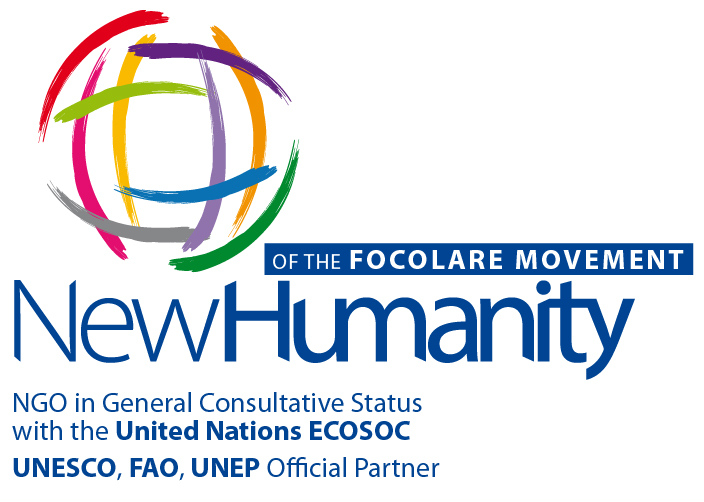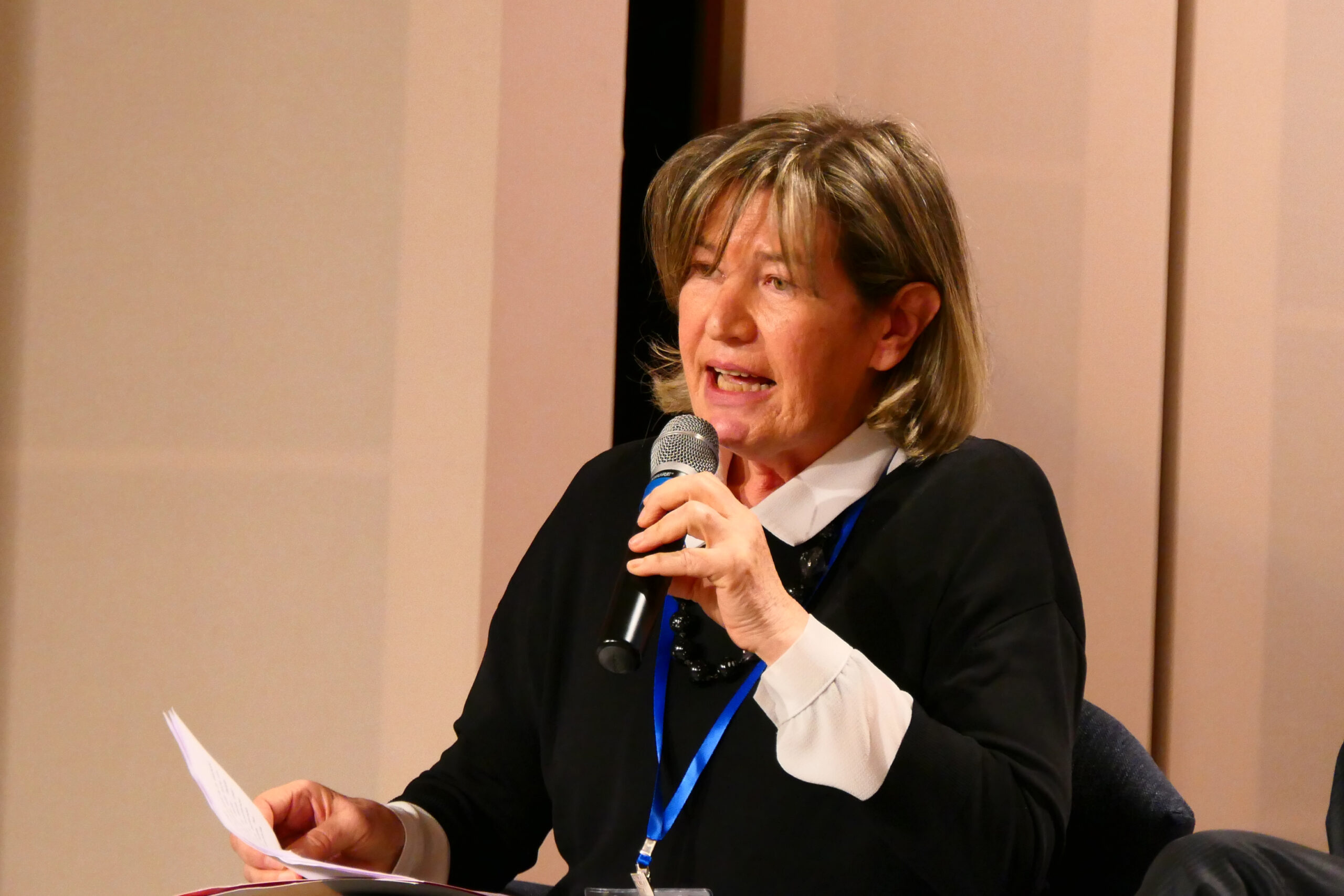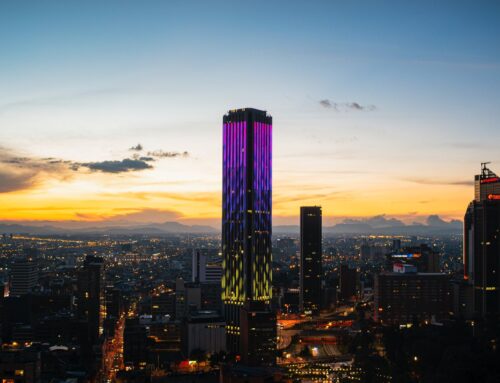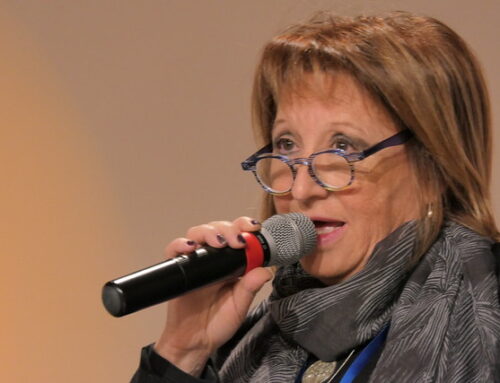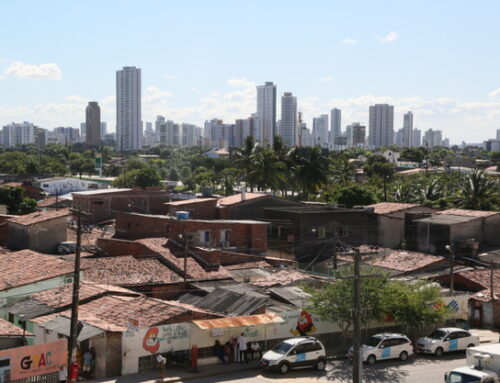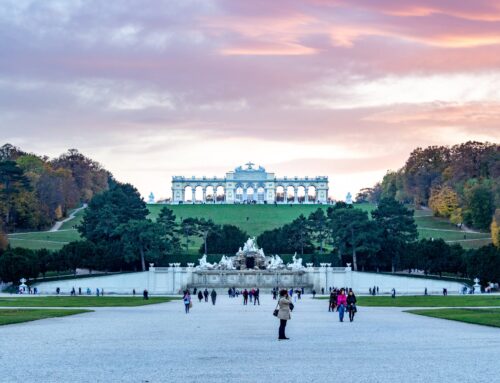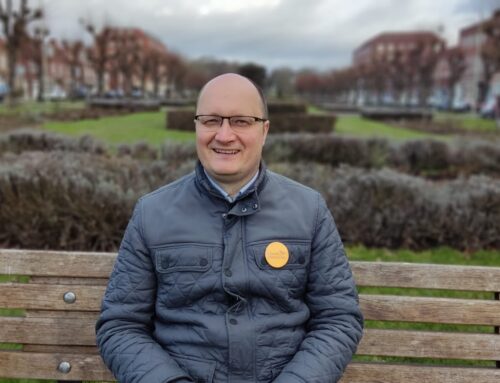Anna Maria Panarotto – “Mamme no PFAS”, (“Mothers against PFAS”) Veneto, Italy
Photo by Thomas Klann – Copyright CSC Audiovisivi
The group “Mamme no PFAS” (“Mothers against PFAS”) arose in the Veneto region in early 2017 in response to reports of the serious pollution of an important aquifer, the largest in Italy and second largest in Europe, from spillage of Perfluoroalkyl and Polyfluoroalkyl Substances (PFAS) carried out over 40 years by a chemical company established in the aquifer’s recharge area, to the point of complete poisoning.
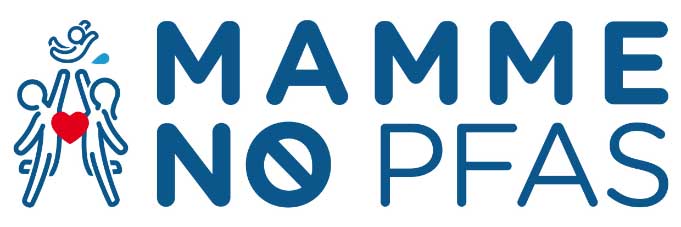
In 2017, when the public health department (Azienda sanitaria pubblica) ordered monitoring of the populace, the values detected were like blades that wounded every family profoundly: despite a maximum tolerated value of 8 ng/ml, the results ranged from 90 to 300, even 1000 ng/ml.
Four concerned and angry moms sought each other out to share the pain. Anger was soon replaced by a determination to do something as mothers and citizens. I am one of them, and I wondered how such a disaster could happen before our eyes. The first need was to understand what had happened; we began to study all the available documentation and discovered that although it had been public for some time, and therefore available to the institutions, until then they had not considered alerting the population. Since 1966, the company had been producing waterproofing substances for countless products of ordinary use, and the highly toxic, bioaccumulative and indestructible processing residues had earned the title of “perfect poison”: one cannot see it, but it penetrates our tissues, acting as an endocrine disruptor and causing thyroid problems, increased cholesterol and decreased male and female fertility.
By now the water table has been polluted, and will remain so for at least 50 years. And since water flows, the waters of rivers and streams, which are polluted, have also been irrigating the countryside and supplying animal farms, so that PFAS have now entered the food chain. It was enough for one to break down; one could envision a difficult path, evidently with hidden interests. Yet Chiara Lubich had passed on to me a high standard for politics and economics, to which also the citizens, even families, must actively contribute. For this reason, supported by so many who share this vision, I have worked hard and continue to do so.
Our group is called “Mamme no PFAS-genitori attivi” (“Mothers against PFAS-active parents”) and counts some thousands of mothers and parents within the whole “red zone”: 32 municipalities in the area where the alarm is most serious. With the documentation in hand, we began to meet with our representatives in the institutions, first of all the mayors, the regional councilors, the president of the Veneto Region and the Minister of the Environment. Straightforward meetings: we knew what to ask of them and we did not feel inferior, rather we decided to stand beside them, in the face of such a serious problem.
October 2017 held the first big public event in the town most affected. Over ten thousand people participated, including 50 mayors, as well as the presidents of the Provinces of Vicenza and Verona. We had the patronage of 120 municipalities. Following this mobilization, our request for clean water led the distribution plant managers to install a series of filters, while the Veneto Region placed limits on the presence of PFAS in the water.
But it was clear that dialogue between the parties was extremely difficult, especially when people were from different camps. For example, a major issue such as the construction of new aqueducts was not moving forward due to the constant rebounding of responsibility among region and department; yet they told us to agree on the decisions to be taken. To overcome the impasse, we promoted a meeting at the Ministry (of Health) with us present, in the style of mothers who sit around a table with their children. Hours of dialogue, to go deeper and mediate, until an agreement was reached and each entity made precise commitments that were funded.
From the beginning, we have also been concerned with European regulations on water for human consumption, a topic already under discussion in the European Parliament, where a group of us was able to go in 2018 for a press conference and speak with many parliamentarians of all groups. After Brussels, we were also in Strasbourg for the vote on some important motions. We will remember that trip as a setback: the motion that was passed, in fact, raised the limits of PFAS in water…. In those weeks we found ourselves able to produce a short video, which we sent by email to the ministers of the environment of the European Union: a simple communication, in which 30 families addressed a direct and personal message to each minister.
A light in those difficult months was the letter we received from Pope Francis, in which he wrote to us, among other things, “…continue with patience and perseverance in seeking good ways to solve the problem.” Patience and perseverance: we have rediscovered these gifts afforded to us as mothers. Experience teaches us that this is our winning weapon: in fact, in these years we have been received by everyone, without intermediaries, finding attentive consideration.
Today we are committed at the regional level to the reclamation of the polluted and polluting site. We are the only group of civil society accredited to the Conference of Services and to the ministry’s technical table. This seems particularly important to us, because it is ethics (the same ethics of our daily life that seeks the good before everything else) that must also guide industrial and political choices. We cannot allow ourselves to be subjugated by blackmail or trade-offs, such as that between health and work.
The case for environmental disaster against the chemical industry Miteni began two years ago; in May 2021 the judge sent 15 managers of the various multinationals that succeeded each other over the years to trial, and next July will begin what has been defined as the largest national trial for pollution. In the meantime, we have also participated in the technical roundtable (which we also obtained through a sit-in!) with the Ministry of Health, the Superior Institute for Environmental Protection and Research, Confindustria, Federchimica, WWF and… Mamme no PFAS. The request to set limits close to zero to highly polluting discharges is a fundamental point for us, even at the national level – to change the visio – because the pollution that we had in Veneto is occurring on a larger scale in other regions.
Finally, there is the collaboration with other groups that we have met over the years, who like us are committed to dealing with serious situations of instability: for this reason, after having been in Taranto, the network “Moms from North to South” was born, which today brings together 50 associations from every region of Italy. Being together is essential to share the wounds of our territories, but also to have more strength and look to the future, to change things.
This experience was presented during the international convention CO-GOVERNANCE co-responsibility in cities today, January 17-20, 2019
Panel 4 – Participatory and deliberative democracy towards a mature Co-Governance

